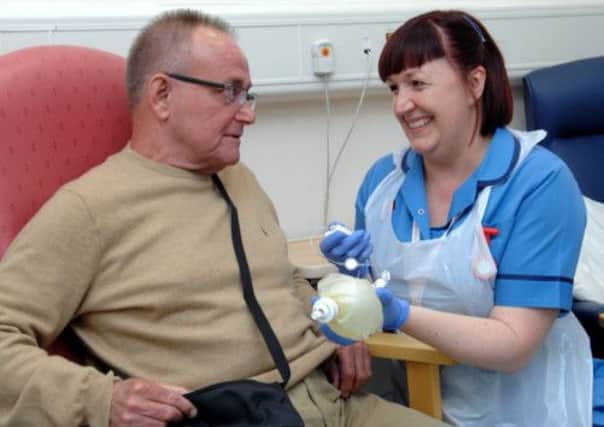The drug pouch that lets patients check out of hospital


He was diagnosed by specialists with a severe and aggressive spinal infection and spent six weeks at Castle Hill Hospital in Cottingham, near Hull, as he was given doses of high-strength antibiotics to combat the problem – with the prospect of further long weeks of treatment to come.
But thanks to an innovative technique being pioneered in the UK at the hospital, he was able to return home receiving drugs via a continuous 24-hour infusion from a device attached to his waist.
Advertisement
Hide AdAdvertisement
Hide AdDoctors say the approach is reducing the time patients spend in hospital, freeing up staff and increasing the range of infections they can treat for outpatients.
It also improves patients’ quality of life by allowing them to get out on their daily business.
Mr Porter, 59, of Beverley, began suffering pains in his side and midriff late last year which got worse and worse over Christmas and into the new year.
“I was still working but taking pretty strong painkillers,” he said.
“By the end of February I was pretty much unable to move.”
Advertisement
Hide AdAdvertisement
Hide AdBecause of the location of his pain, doctors suspected Mr Porter had inflammation of his rib cartilage but this failed to settle down and the pain worsened.
After he was admitted to hospital, MRI scans revealed severe damage affecting his spine which left him potentially facing a nine-hour operation until blood tests indicated he had a severe infection.
He was fitted with a spinal brace, laid on a flat bed and every six hours was hooked up to a line to drip-feed him antibiotics for an hour as his condition improved over six weeks.
But he faced an even longer stay in hospital under the same drug regime until he was offered the choice of an infusion of antibiotics from a device about the size of a grapefruit attached to a carry-pouch on his waist linked to a vein in his chest.
Advertisement
Hide AdAdvertisement
Hide AdEach day he visited the outpatients department at the Queen’s Centre at the hospital to have the drugs replenished.
“Without this technique I would have just stayed in hospital – that’s the liberating thing about this,” he said.
The only problem came at night as he had to hang the device on a bedpost and remember it was there.
Gavin Barlow, a consultant in infectious diseases at Castle Hill, said there were a number of “red flag” infections which needed between four and 12 weeks of intravenous antibiotics.
Advertisement
Hide AdAdvertisement
Hide AdTraditionally, patients had been kept in hospital for the infusions, but now the hospital offered them the chance of going home once it was safe for them to do so, he said.
They then usually returned daily as outpatients to receive further antibiotics for as long as it was needed in sessions lasting up to 90 minutes.
Mr Barlow said treatment via the infusion device was unique in the UK – although the approach was commonplace in Australia where a colleague had first seen it in action.
Around 15 patients with spinal, lung, pelvic, bone or joint infections are among those who have so far benefited.
Advertisement
Hide AdAdvertisement
Hide AdPatients need to return each day but it takes just five to 10 minutes to replace the drugs. Mr Barlow said the approach also enabled patients to receive a wider-range of antibiotics, as there were only a small number given on a once-a-day basis which lasted in the body for 24 hours. It also allowed staff to treat a wider range of infections for outpatients.
“We’ve had quite a lot of interest from around the country about this,” he added.
“It increases the capacity of our service and makes it more cost- effective.”
The team now intend to increase the use of 24-hour infusions, teaching some patients to change their infusions, allowing them to come back once a week.
Advertisement
Hide AdAdvertisement
Hide AdMr Porter said the infection had now gone and his back was recovering.
Scans showed two vertabrae between his shoulder blades had welded themselves together but he hoped to have no long-term ill effects and planned to return to his dental practice in Cottingham next year after fully recovering from his ordeal.
He said: “I seem to be cured and hopefully will be able to return to work whereas I once faced premature retirement, extensive surgery and possible paralysis.
“The team at Castle Hill Hospital have been magnificent and their praise should be sung from the rooftops.”